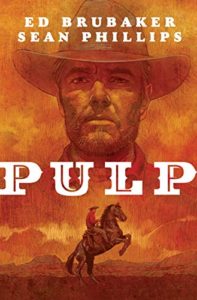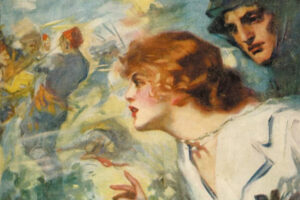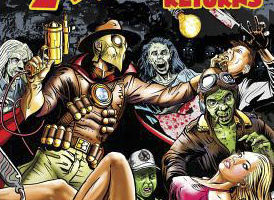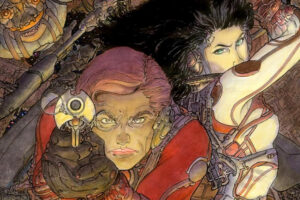 Writer Ed Brubaker and artist Sean Philips have done several comic book series that I think would be called “crime noir.” These include the long-running Criminal, Kill or Be Killed and more. But I really took notice of him when he did his pulp-inspired series Incognito and later Fatale, both of which I reviewed here. While Brubaker clearly has his own take, he also showed respect for the pulp field, even to getting Jess Nevins and others to write articles on the pulp heroes and related subjects in these two series.
Writer Ed Brubaker and artist Sean Philips have done several comic book series that I think would be called “crime noir.” These include the long-running Criminal, Kill or Be Killed and more. But I really took notice of him when he did his pulp-inspired series Incognito and later Fatale, both of which I reviewed here. While Brubaker clearly has his own take, he also showed respect for the pulp field, even to getting Jess Nevins and others to write articles on the pulp heroes and related subjects in these two series.
So when they came together to do another pulp-influenced story, the graphic novel Pulp, I knew I had to check it out. Coming from Image Comics it is a hardcover graphic novel that takes its inspiration from the western pulps, which I have to admit I am not really into.
Set in 1939 New York City, the story focuses on pulp author Max Winter. An elderly man, he is ecking out an existance writing pulp stories about the Red River Kid, a fictional Western outlaw set in the 1890s. We see the issues he faces. His publisher cuts back his rate to two cents a word. And the raising number of Nazi bundist bothers him. And he is having health issues, include heart attacks.
But we slowly learn that Max Winter is not really Max Winter. And he is actually writing from life. He was originally Max Williams, also known as the Red Rock Kid. When he and his brother were burned out of their farm by men hired by cattle barons, he became an outlaw, robbing banks and trains until retiring to Mexico, setting down, marrying, and having a daughter.
But now he’s living in New York with Rosa, a Hispanic woman who works as a maid. But when his publisher basically replaces him with someone who will write the Red River Kid for a cent a word, he starts getting desperate, looking at maybe return to being an outlaw.
This leads to him being stopped before it’s too late by Jeremiah Goldman, a former Pinkerton detective who actually had pursued him in the old days. Instead, he needs Max’s help with a robbery against the Nazi Bund. This will lead us to the end of this story.
You’ll need to read it yourself to see how it turns out. I felt it was well done, a great mixture of old time Western (thru flash backs), “modern” crime story, and current events. I did wonder about some aspects of the pulp world. Max’s editor paid him in cash. I would have thought a check was more likely, as part of keeping the rights, though maybe his publisher was a little more shady, especially with how he treated Max.
The matter about the pay rate also bothers me. I had always heard that the ‘standard’ rate was a penny a word. If you were a more popular author, you could get more. I know that pulp authors like Lester Dent, Walter Gibson, and H. Bedford-Jones were paid more. When the Munsey pulps couldn’t pay Burroughs the rate he expected, he went to Blue Book. And when they later couldn’t, he left. So while Max Winter had his rate cut to 2 cents a word, it was still better then most. The more cut-rate publishers paid less then a cent a word, but that was for lesser works. And replacing an author with someone at a lower pay scale seems more the style of the cut-rate publishers. If Max was selling, there is no reason for that. And if he was selling, he should have gone elsewhere.
Many pulp authors wrote what they knew. So world travelers wrote adventure tales set in places they knew, aviators wrote aviation stories, and those with first-hand knowledge of the West wrote westerns. But most pulp authors wrote for more than one publisher, to get the most from their work. Brubaker has Max only working for one publisher. That is rare UNLESS the author was being treated well.
That aside, I thought Pulp was great. It clocks in at 72 pages overall. If there was any disappointment is that after Incognito and Fatale, I really was hoping for an article on maybe western pulps or the like. But if you like Brubaker’s work, especially his pulp-inspired works, check it out. I would love to see something similar to this coming out from him. I’d really like to see a conclusion to the Incognito storyline.




Your comments